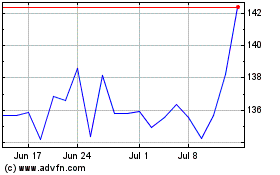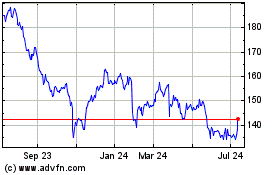By Mike Esterl in and Doug Cameron in
Atlanta
Chicago
United Parcel Service Inc. is forecasting record holiday
shipments after traffic surged in the third quarter, spurred by
rising e-commerce in the U.S. and robust growth in Asia and
Europe.
In the wake of both the good news and growing competition, UPS
said Thursday it is boosting capital spending and buying 14
jumbo-sized Boeing Co. airplanes to be delivered between 2017 and
2020. It is the first order for planes by the parcel delivery giant
since 2008. UPS and Boeing didn't disclose the cost of the Boeing
747-8s, which have a total list price of $5.3 billion before
discounts.
The plane order comes as some pockets of Asia, including China
and Hong Kong, are growing at rates UPS has never seen before, Jim
Barber, president of UPS International, told analysts on Thursday's
earnings call. Europe, he said, "continues to speed itself up." UPS
says demand for international cross-border online sales is growing
six times faster than the broader economy.
The Atlanta company expects to handle more than 700 million
packages globally between Thanksgiving and New Year's Eve, up 14%
from last year's holiday season. This year has two extra shipping
days; without them, the increase is closer to 5%.
Average daily package volume rose 5.7% in the U.S. in the three
months ended Sept. 30, compared with the same period last year.
That is more than double the 2.5% year-on-year growth in the second
quarter.
Daily export volumes for international packages soared 7.1% in
the latest quarter, compared with 3.9% growth in the second
quarter. The acceleration was fueled by double-digit percentage
gains out of Asia and a high-single-digit increase in cross-border
shipments within Europe.
UPS is stepping up investments after chief rival FedEx Corp.
bought Dutch parcel delivery company TNT Express NV in May for
nearly $5 billion, FedEx's largest acquisition ever. The heightened
spending also comes as Amazon.com Inc., a key UPS and FedEx
customer, lays the groundwork for its own shipping business.
"We're doing this [increasing investments] because we have to
move packages as part of our growth strategy," both in terms of
revenue and profit, UPS Chief Executive David Abney said in an
interview.
UPS cautioned it expects to make a year-end, mark-to-market
pension accounting adjustment in the fourth quarter that could be
material. It reiterated it expects earnings-per-share of $5.70 to
$5.90 in 2016 without the accounting adjustment.
The company's share price was down 0.7% at $107.85 in afternoon
trade on the New York Stock Exchange after third-quarter profit met
analysts' consensus estimate and topped revenue expectations.
Mr. Abney said the company is spending $2.8 billion on capital
expenditures this year, up about $500 million from 2015. He noted
UPS has spent about 4.5% to 5% of revenue on capital expenditures
in recent years, down from 6% to 8% historically.
In the U.S., business-to-consumer deliveries rose 11% in the
quarter, compared with 2% growth for business-to-business
shipments. Most of the latter came from online retail returns.
About one in five e-commerce packages shipped to consumers are
returned.
Executives said the new, larger Boeing 747-8 jumbo freighters
will fly mostly intercontinental routes. The new planes have 16%
more capacity than its Boeing 747-400 cargo planes, some of which
will be redeployed to the U.S.
UPS has opened or expanded 15 hubs across the U.S. to prepare
for this year's holiday-shipping season. It also will fully deploy
its new route navigation system, Orion, for the first time and has
added thousands of delivery car positions.
The company plans to hire about 95,000 temporary workers, the
same as last year, as it leans more heavily on automation to handle
the increased package traffic.
UPS's jumbo freighter order doubled Boeing's order book for the
jet and is a huge boost for the 747-8 program as both the passenger
and freighter versions have been slow sellers. Airlines have opted
for smaller planes and the moribund air cargo market has led others
to cancel planned purchases.
Boeing has halved production to six planes a year and warned in
regulatory filings that it may stop making them unless market
conditions improve.
UPS is expected to have secured steep discounts from Boeing and
may be able to unload some of its older 747 cargo jets to Boeing as
part of the deal, said one aircraft financier familiar with the
negotiations.
The plane maker has just 15 firm orders for the 747-8, including
six for the freighter version after securing a deal for four this
year from AirBridgeCargo Airlines LLC.
Boeing has been renting rather than selling some of the new
planes and has more than $1 billion in exposure to 747 leases on
its balance sheet, according to a regulatory filing.
It has produced some 747-8s that still lack a customer, but
Boeing said the UPS planes would all be newly built. UPS also has
an option to buy 14 additional planes.
Boeing Chief Executive Dennis Muilenburg said on the company's
quarterly earnings call this week that 747 production was
sustainable at six a year. The U.S. Air Force is due to acquire two
of the planes for use as the future Air Force One fleet.
The biggest operators of the 747-8 cargo jet are Cargolux
Airlines International SA and Cathay Pacific Airways Ltd., with 14
apiece.
Write to Mike Esterl at mike.esterl@wsj.com and Doug Cameron at
doug.cameron@wsj.com
(END) Dow Jones Newswires
October 27, 2016 15:36 ET (19:36 GMT)
Copyright (c) 2016 Dow Jones & Company, Inc.
United Parcel Service (NYSE:UPS)
Historical Stock Chart
From Mar 2024 to Apr 2024

United Parcel Service (NYSE:UPS)
Historical Stock Chart
From Apr 2023 to Apr 2024
